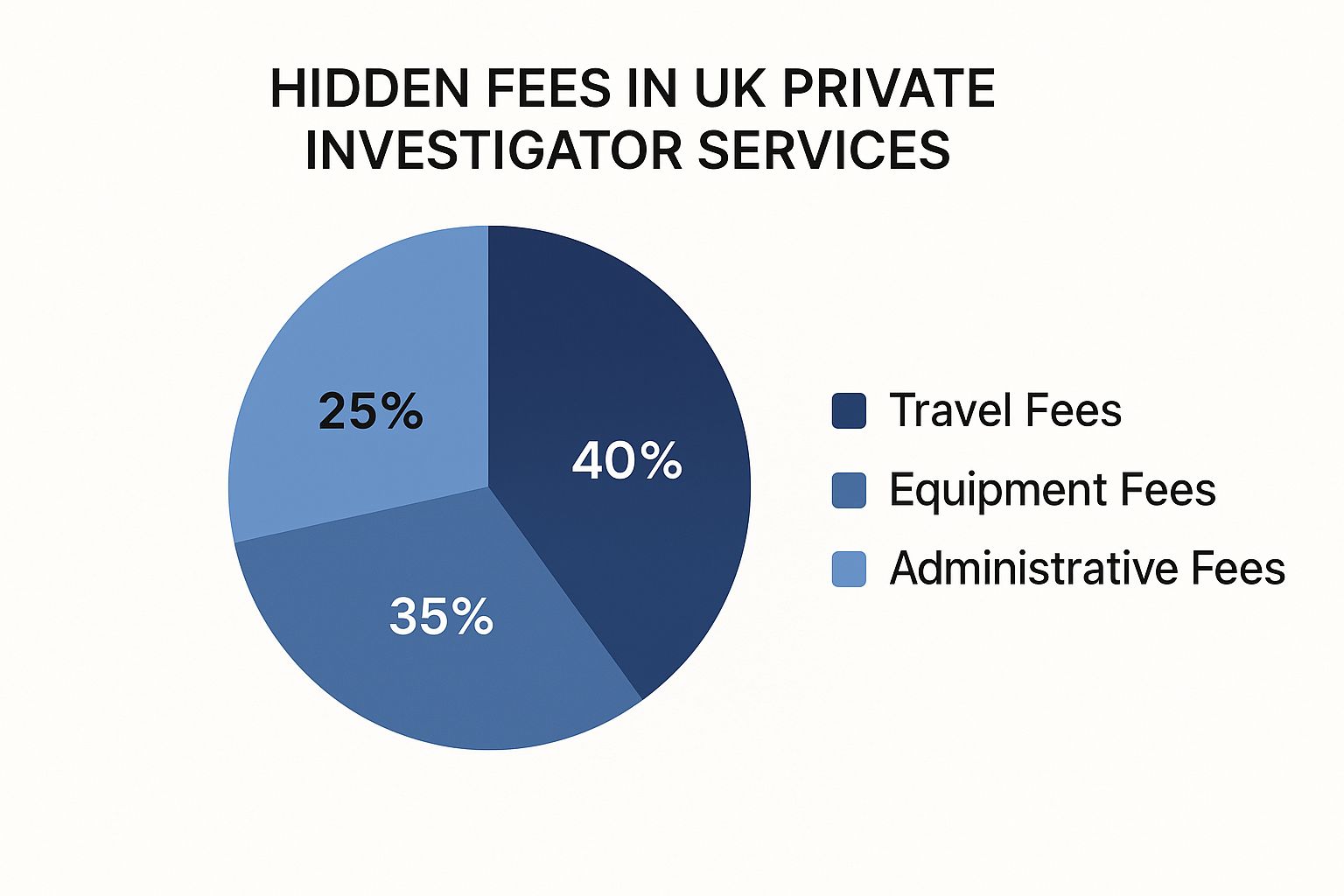When you start looking into hiring a private investigator, the first question on your mind is usually “How much is this going to cost?” It’s a fair question, and the answer isn’t always straightforward.
In the UK, you can generally expect to pay somewhere between £45 and £85 per hour, with a common rate floating around the £50-£55 mark. But that’s just a ballpark figure. The final bill depends entirely on what you need done, how tricky the case is, and the investigator’s own experience level.
Answering Your Core Question: UK Investigator Costs
Figuring out the cost is the first real step in getting the answers you need. Hiring a private investigator isn’t like buying a product off a shelf with a set price tag. It’s much more like bringing in a specialist for a bespoke service; the price directly reflects the expertise, time, and resources needed to get the job done right. A quick, simple background check is naturally going to be a lot less expensive than a complex surveillance operation that spans several weeks.
A few key things will always shape the final quote. The investigator’s background and skill set play a huge role, as does the location—running an operation in central London will almost always cost more than in a smaller town. The type of work you need is, of course, the biggest factor. To get a better feel for what goes into the work and why it costs what it does, it’s worth understanding what a private investigator does and the real value they bring to the table.
To give you a clearer idea right from the start, let’s break down some of the typical costs you might encounter for common services.
Estimated UK Private Investigator Costs At A Glance
This table gives you a quick snapshot of the typical costs for common private investigation services across the UK. It covers both the hourly rates you might see and the fixed-fee packages that are often available.
| Service Type | Typical Hourly Rate | Potential Fixed Fee Range |
|---|---|---|
| Surveillance (e.g., Infidelity) | £45 – £85+ | £250 – £700 (for a half/full day) |
| Basic Background Check | N/A (usually fixed fee) | £150 – £400 |
| Tracing a Missing Person/Debtor | N/A (usually fixed fee) | £200 – £600+ |
| Corporate Investigation | £60 – £120+ | Varies significantly based on scope |
Keep in mind these are estimates. The true cost will always come down to the specific details of your situation, but this should give you a solid starting point for budgeting.
How Private Investigators Charge For Their Time

Before you can work out a budget, you need to get your head around how private investigators actually bill for their services. The quotes might look a bit confusing at first glance, but most of them boil down to two main ways of charging, each best suited for different kinds of jobs.
Think of it like getting a builder in. If you want a simple job done, like hanging a new door, it’s a predictable task. The builder knows exactly what’s involved and how long it will take, so they’ll give you a fixed fee – one price for the whole job, no surprises.
But what if you’ve got a mysterious damp patch on the ceiling? That’s a different story. The builder has no idea what’s causing it or how long it’ll take to find and fix the source. In that situation, they’ll charge you an hourly rate for their time and expertise.
The Two Main Pricing Models
Private investigators work in a very similar way. The pricing structure they use is all about matching the cost to the nature of the job, which keeps things fair for everyone.
- Fixed Fee: This is what you’ll usually see for services with a clear-cut start and finish. Think of a standard background check or finding a debtor’s current address. The scope of work is known from the outset, so the agency can confidently offer a set price.
- Hourly Rate: For jobs where the duration is anyone’s guess, like a surveillance operation in a cheating partner case, an hourly rate is the industry standard. This gives both you and the investigator the flexibility needed for cases that can change direction or drag on for days.
In the UK, the cost of hiring a private investigator can vary quite a bit, with hourly rates generally falling between £30 and £85. Most experienced professionals tend to charge somewhere in the region of £50 to £55 per hour. It’s also common for investigators to have a minimum booking time, often a four-hour block, to make the assignment worthwhile.
What Is a Retainer?
For more involved or lengthy investigations, you’ll almost certainly be asked to pay a retainer. Don’t let the term put you off – it’s just an upfront payment to get the ball rolling.
A retainer is essentially a deposit that secures the investigator’s availability and covers the initial costs of the case. It works like a pre-payment for a certain number of hours, and any money that isn’t used is usually refunded to you once the job is complete.
This system is really practical. It means your investigator can start working immediately without getting bogged down in admin, which is crucial when time is of the essence. It also sets a clear budget for the first stage of the investigation.
By understanding these common pricing models, you’ll be in a much better position to make sense of any quotes you get. You’ll know exactly what you’re paying for and why. To learn more about the specific tasks these fees cover, it’s worth reading our guide on what private investigators do.
The Key Factors That Determine Your Final Bill

You might get a few different quotes for what looks like the same job and find yourself scratching your head at the price difference. The reality is, no two investigations are ever the same. Several key variables come into play that shape the final figure on your invoice, and getting to grips with them helps you see what you’re really paying for.
Think of it like hiring a skilled tradesperson. The final cost of a custom-built wardrobe isn’t just about the wood; it’s about the craftsman’s time, the complexity of the design, and their years of experience. Private investigation is much the same – you’re investing in expertise, hours, and resources, all shaped to fit your unique situation.
Investigator Experience and Specialisation
One of the biggest factors influencing the cost is the investigator’s background. An operative with decades under their belt, maybe a former police detective or military intelligence officer, is naturally going to charge more than a newcomer. You’re paying for their hard-won skills.
For example, an investigator who’s a whizz at digital forensics for complex corporate cases will have a completely different rate to someone who specialises in matrimonial surveillance. Their specific expertise directly affects how efficiently they work and the quality of the evidence they can uncover.
When you’re looking at private investigator costs, remember that a higher price often reflects a deeper well of experience. It’s an investment in a professional who knows how to get a successful, legally sound result.
This is precisely why rates can vary so much. While the average hourly fee in the UK hovers around £70, it’s not uncommon to see prices ranging anywhere from £45 to £120. That wide gap is often down to an investigator’s background and track record.
Case Complexity and Scope
The nature of the job itself is, of course, a huge piece of the puzzle. A straightforward task, like a simple address trace to find a debtor, follows a well-trodden path. It’s a defined job with a clear finish line, so it’s relatively inexpensive.
Compare that to a tangled corporate fraud case. This could involve multiple suspects, deep-dive digital forensics, and weeks of meticulous surveillance. These investigations demand far more man-hours, specialist equipment, and strategic planning, all of which drive up the final cost. To get a better feel for this, our guide on what a private investigator can do breaks down the wide range of services they offer.
Geographical Location and Urgency
Don’t forget that where the investigation happens makes a difference. Conducting surveillance in central London, with its higher transport costs and general expenses, will almost always cost more than a similar job in a quiet rural town.
Finally, there’s the question of urgency. If you need answers, and you need them now, be prepared for the price to reflect that. Urgent cases often mean the investigator has to drop everything, reshuffle their schedule, and pour all their resources into your case immediately. That premium you pay is for their immediate, undivided attention.
A Price Guide for Common Investigation Services
Knowing the difference between hourly and day rates is a great starting point, but let’s talk real-world numbers. What can you actually expect to pay for a private investigator in the UK? The final bill will always come down to the time, skill, and risk needed to get you a conclusive result.
Think of it like hiring any specialist tradesperson. A plumber won’t charge the same for fixing a leaky tap as they would for a full boiler replacement. In the same way, a simple database search for a PI is a world away from a multi-day surveillance operation, and the pricing reflects that reality.
So, let’s break down the typical costs for some of the most common services people come to us for.
Matrimonial and Infidelity Surveillance
This is, without a doubt, one of the most common reasons someone picks up the phone to a private investigator. The entire goal is to get concrete, undeniable proof of a partner’s movements and actions, which demands a huge amount of patience and, above all, discretion.
- Half-Day Surveillance (4-5 hours): You’re likely looking at a cost between £250 – £400. This is a good option if you need to confirm suspicions during a specific window of time, like when your partner claims to be working late.
- Full-Day Surveillance (8-10 hours): The price for this usually lands between £450 – £700. A full day gives the investigator a much better chance of capturing a complete picture of someone’s day.
These kinds of packages will typically include the time of one or two agents, the use of a standard vehicle, and, most importantly, a detailed final report with time-stamped photos or video footage.
Background Checks
The term “background check” can mean a lot of different things, and the cost varies just as widely. A basic check is all about verifying a few key facts, whereas a comprehensive investigation goes much, much deeper into someone’s past.
A background check isn’t just for checking up on a new hire. It’s a crucial due diligence tool before going into business with someone, a safety net for online dating, or a way to properly vet a potential tenant. The price you pay is directly tied to how many layers of that person’s history you need to uncover.
A basic check that confirms identity and address history might set you back £150 – £400. On the other hand, a truly comprehensive investigation that delves into financial red flags, previous court cases, or hidden business interests could start from £500 and go up from there.
Tracing Missing Persons and Debtors
Finding someone who has gone off the grid is a real art. The cost hinges on how cold the trail is and, crucially, how much information you can give the investigator at the start.
A straightforward “no-find, no-fee” trace on a debtor with a recent last known address can be surprisingly affordable, often between £200 – £450. But if you’re trying to find a long-lost relative with only a few scraps of information, the case becomes far more complex and will likely cost £600 or more. Some agencies even have specialised techniques for these tricky situations; you can get a better sense of the methods involved by learning about tracing telephone numbers in the UK.
Corporate Investigations
This is where things can get really complex, and the costs reflect that. Corporate investigations are about protecting a company’s money, reputation, and future.
- Employee Misconduct or Fraud: Getting to the bottom of internal theft or proving an employee is secretly working for a competitor can easily run into the thousands, often beginning with a retainer of £1,000 – £4,000.
- Due Diligence: Properly vetting a new business partner or an acquisition target is an incredibly detailed process. It involves deep dives into financial records and legal histories, with costs typically starting at £1,500 and climbing depending on the size of the company involved.
To give you a clearer picture, I’ve put together a table summarising the typical costs for these key services.
UK Price Guide For Specific Investigation Services
This table provides a snapshot of the estimated costs for some of the most popular private investigation services in the UK, from straightforward tracing jobs to more involved corporate cases.
| Investigation Service | Typical Pricing Structure | Estimated Cost Range (£) |
|---|---|---|
| Infidelity Surveillance | Half-day / Full-day rate | £250 – £700 |
| Basic Background Check | Fixed fee | £150 – £400 |
| Comprehensive Background Check | Fixed fee or hourly | £500+ |
| “No-Find, No-Fee” Debtor Trace | Fixed fee (conditional) | £200 – £450 |
| Complex Missing Person Trace | Hourly or day rate | £600+ |
| Employee Misconduct | Retainer + hourly/day rate | £1,000 – £4,000+ |
| Corporate Due Diligence | Project fee | £1,500+ |
These figures are a solid guide, but remember they can shift based on the specifics of your case. Always have a detailed conversation about costs before committing.
Beyond the base rates, it’s also worth being aware of the extra fees that can sometimes crop up on an invoice.

As you can see, things like travel and specialised equipment often make up the bulk of any additional costs. This is exactly why it’s so important to get everything in writing from the very beginning.
Looking Out for Hidden Costs and Extra Expenses
The hourly or daily rate you’re quoted is the headline figure, but it’s rarely the whole story. To get a real grip on what a private investigator will cost you, it’s vital to look beyond that initial number and ask about the other expenses that can crop up.
Think of it like booking a flight. The ticket price gets you on the plane, but you’ll pay extra for checked luggage, choosing your seat, and that G&T. In the same way, an investigator’s time is the core service, but the practical tools and resources needed to get the job done often carry their own costs.
Common Additional Charges to Expect
Any professional agency worth its salt will be upfront about these potential extras from the get-go. They aren’t trying to pull a fast one; these are just the normal, variable costs of an investigation. Knowing about them helps you budget properly and avoids any nasty shocks when the final bill arrives.
Here are a few common examples you should anticipate:
- Mileage and Travel: If an investigator needs to follow a subject or travel between locations, you can almost guarantee you’ll be charged for fuel and vehicle use.
- Specialised Equipment: Sometimes the job calls for specific gear, like high-spec surveillance cameras or legally deployed GPS trackers. These might come with a daily or weekly rental fee.
- Database and Report Fees: Investigators don’t get free access to official databases. The search fees they pay to pull information are typically passed on to the client.
- Evidence Preparation: Putting together a detailed, court-ready evidence bundle with reports, time-stamped photos, and video footage can sometimes be billed as a separate administrative task.
It’s absolutely crucial to ask for a full breakdown of all potential expenses before you agree to anything. A clear, itemised quote is the hallmark of a trustworthy and transparent investigator.
This kind of financial clarity is non-negotiable. Extra expenses like travel, often billed at around 45p per mile, are usually separate from the main hourly rate. The complexity of the work also plays a big part; a deep-dive asset search report can run upwards of £550, while urgent jobs that need immediate attention will naturally cost more. To get a better feel for these variables, it helps to review detailed UK price guides.
By talking through these possibilities from the start, you make sure everyone is on the same page. A reputable investigator wants you to feel confident and fully informed about the costs involved, so never be afraid to ask for a complete projection before the work begins.
How to Hire the Right Investigator at a Fair Price

Knowing the typical costs of a private investigator is one thing, but actually choosing the right person for the job is where it gets tricky. It’s easy to get drawn in by a low price, but you have to resist the temptation. When you’re dealing with sensitive personal or legal issues, the cheapest quote is almost never the best path forward.
Going with a cut-price investigator can end up costing you far more in the long run. Imagine receiving evidence that’s completely unusable in court, or worse, finding out your investigator was so clumsy they got spotted and compromised the entire case. A true professional delivers real value and results, not just a low bill.
Your Pre-Hiring Checklist
Before you even think about signing a contract, you need to do a bit of your own investigating. A legitimate PI will be more than happy to show you they’re the real deal.
Here’s a quick checklist of what you absolutely must verify:
- Professional Memberships: Are they part of a respected organisation like the Association of British Investigators (ABI)? These bodies hold their members to a strict code of ethics.
- ICO Registration: Any investigator who handles personal data must be registered with the Information Commissioner’s Office (ICO). This isn’t optional; it’s the law.
- Verifiable Reviews: Don’t just rely on testimonials from their website. Look for genuine, independent reviews that give you a feel for their track record.
- Clear Communication: How do they come across in emails and on the phone? If their messages are full of typos and poor grammar, that’s a massive red flag. Professional reports need to be clear and articulate.
Remember, the private investigation industry in the UK is currently unregulated. This means anyone can build a website and call themselves a PI. Verifying these credentials is your best protection against amateurs and scammers.
Asking the right questions from the get-go is the key to getting a transparent quote and feeling confident in your decision. It’s not just about the final figure; you need to understand the entire process. For a deeper dive into this, our guide on how to hire a private investigator in the UK offers some really practical advice.
Always insist on a full breakdown of all potential fees. Ask about mileage, equipment costs, and report-writing time. This upfront clarity ensures there are no nasty surprises on the final invoice and helps you find a credible investigator who will deliver the conclusive answers you’re paying for.
A Few Final Questions Answered
To round things off, let’s tackle some of the most common questions people have when they’re first looking into hiring a private investigator. It’s natural to have queries, and understanding these points will give you more confidence in the process.
Is It Actually Legal to Hire a Private Investigator in the UK?
Absolutely. Hiring a private investigator in the UK is completely legal. The key is that a professional investigator operates squarely within the boundaries of the law.
They don’t have any special legal powers like the police. Instead, they rely on skill, experience, and ethical methods to gather information, always respecting regulations like GDPR and the Human Rights Act.
Can You Guarantee a Certain Result?
This is a crucial one. No professional, reputable investigator will ever guarantee a specific outcome. Think of it this way: you’re hiring them for their time, their skills, and their commitment to finding the facts—whatever those facts may be.
Anyone promising a particular result is a major red flag. It often points to inexperience or, worse, a scam. What you’re paying for is a thorough, professional investigation, not a pre-written ending.
How Do I Know My Case Will Be Kept Confidential?
Confidentiality isn’t just a promise; it’s the bedrock of the entire profession. Legitimate agencies are legally bound by strict data protection laws (always check they are registered with the ICO) and a professional code of ethics.
Every conversation, every finding, and every report is handled with total discretion.
A key part of the cost of a private investigator in the UK is paying for this assurance. Your identity and the details of your case are protected, ensuring the entire process remains completely confidential from start to finish.
Can the Evidence You Find Be Used in Court?
Yes, provided it has been gathered legally and ethically, the evidence collected by a private investigator is often admissible in court. In fact, it can be incredibly persuasive.
Well-documented evidence like time-stamped surveillance footage, detailed reports, and verified witness statements can be game-changers in legal situations, from child custody battles to complex employment tribunals.
At UK Private Investigators, we mix decades of hands-on experience with a firm belief in being clear and upfront with our clients. If you need professional, discreet help with a personal or business matter, we’re here to listen. For a no-obligation quote and a confidential chat about your situation, contact our expert team today.

